Recording and translation © A. P. David 2022.
Greek text hyperlinked to lexica via Perseus (perseus.tufts.edu):
‘σὸς δέ που ἔκφυγε κῆρας ἀδελφεὸς ἠδ᾽ ὑπάλυξεν
ἐν νηυσὶ γλαφυρῇσι: σάωσε δὲ πότνια Ἥρη.
ἀλλ᾽ ὅτε δὴ τάχ᾽ ἔμελλε Μαλειάων ὄρος αἰπὺ
ἵξεσθαι, τότε δή μιν ἀναρπάξασα θύελλα
πόντον ἐπ᾽ ἰχθυόεντα φέρεν βαρέα στενάχοντα,
ἀγροῦ ἐπ᾽ ἐσχατιήν, ὅθι δώματα ναῖε Θυέστης
τὸ πρίν, ἀτὰρ τότ᾽ ἔναιε Θυεστιάδης Αἴγισθος.
ἀλλ᾽ ὅτε δὴ καὶ κεῖθεν ἐφαίνετο νόστος ἀπήμων,
ἂψ δὲ θεοὶ οὖρον στρέψαν, καὶ οἴκαδ᾽ ἵκοντο,
ἦ τοι ὁ μὲν χαίρων ἐπεβήσετο πατρίδος αἴης
καὶ κύνει ἁπτόμενος ἣν πατρίδα: πολλὰ δ᾽ ἀπ᾽ αὐτοῦ
δάκρυα θερμὰ χέοντ᾽, ἐπεὶ ἀσπασίως ἴδε γαῖαν.
τὸν δ᾽ ἄρ᾽ ἀπὸ σκοπιῆς εἶδε σκοπός, ὅν ῥα καθεῖσεν
Αἴγισθος δολόμητις ἄγων, ὑπὸ δ᾽ ἔσχετο μισθὸν
χρυσοῦ δοιὰ τάλαντα: φύλασσε δ᾽ ὅ γ᾽ εἰς ἐνιαυτόν,
μή ἑ λάθοι παριών, μνήσαιτο δὲ θούριδος ἀλκῆς.
βῆ δ᾽ ἴμεν ἀγγελέων πρὸς δώματα ποιμένι λαῶν.
αὐτίκα δ᾽ Αἴγισθος δολίην ἐφράσσατο τέχνην:
κρινάμενος κατὰ δῆμον ἐείκοσι φῶτας ἀρίστους
εἷσε λόχον, ἑτέρωθι δ᾽ ἀνώγει δαῖτα πένεσθαι.
αὐτὰρ ὁ βῆ καλέων Ἀγαμέμνονα, ποιμένα λαῶν
ἵπποισιν καὶ ὄχεσφιν, ἀεικέα μερμηρίζων.
τὸν δ᾽ οὐκ εἰδότ᾽ ὄλεθρον ἀνήγαγε καὶ κατέπεφνεν
δειπνίσσας, ὥς τίς τε κατέκτανε βοῦν ἐπὶ φάτνῃ.
οὐδέ τις Ἀτρεΐδεω ἑτάρων λίπεθ᾽ οἵ οἱ ἕποντο,
οὐδέ τις Αἰγίσθου, ἀλλ᾽ ἔκταθεν ἐν μεγάροισιν.’
Samuel Butler’s translation with certain names Hellenised:
“‘Your brother and his ships escaped, for Hera protected him, but
when he was just about to reach the high promontory of Malea, he was
caught by a heavy gale which carried him out to sea again sorely against
his will, and drove him to the foreland where Thyestes used to dwell,
but where Aegisthus was then living. By and by, however, it seemed
as though he was to return safely after all, for the gods backed the
wind into its old quarter and they reached home; whereon Agamemnon
kissed his native soil, and shed tears of joy at finding himself in
his own country.
“‘Now there was a watchman whom Aegisthus kept always on the watch,
and to whom he had promised two talents of gold. This man had been
looking out for a whole year to make sure that Agamemnon did not give
him the slip and prepare war; when, therefore, this man saw Agamemnon
go by, he went and told Aegisthus who at once began to lay a plot
for him. He picked twenty of his bravest warriors and placed them
in ambuscade on one side the cloister, while on the opposite side
he prepared a banquet. Then he sent his chariots and horsemen to Agamemnon,
and invited him to the feast, but he meant foul play. He got him there,
all unsuspicious of the doom that was awaiting him, and killed him
when the banquet was over as though he were butchering an ox in the
shambles; not one of Agamemnon's followers was left alive, nor yet
one of Aegisthus', but they were all killed there in the cloisters.’








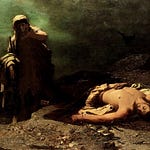
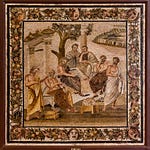


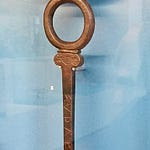
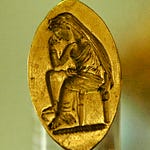
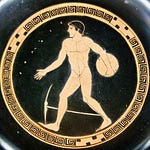
Homer's Odyssey δ 4.512-37